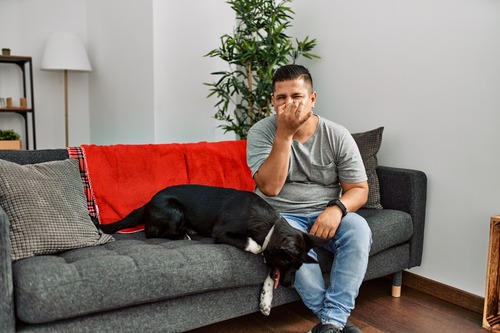Understanding why your dog smells so bad can be perplexing and frustrating. This article aims to shed light on the potential reasons behind your dog’s bad odor and what steps you can take to address the issue. Remember, while this article provides useful insights, it is not a substitute for professional veterinary advice. For any concerns, please call Shawsheen Animal Hospital at (978) 851-5558 or request an appointment online.
Common Causes of Bad Odor in Dogs
Several factors can contribute to why your dog smells so bad. Identifying the source of the odor is crucial in determining the appropriate action to take.
Poor Dental Hygiene
Dental hygiene is often an overlooked aspect of pet care, yet it plays a significant role in your dog’s overall health and can be a common reason why your dog smells so bad. If your dog has bad breath, it could indicate dental disease or other health issues. Plaque buildup, gum disease, and tooth decay can all cause foul odors. Regular brushing of your dog’s teeth and professional dental cleanings can help alleviate this problem.
Skin Conditions
Dogs can suffer from a variety of skin conditions that might cause unpleasant smells. Skin infections, allergies, or infestations of parasites like fleas and ticks can all result in a bad odor. If your dog’s skin appears red, inflamed, or has open sores, it’s essential to seek veterinary care promptly.
Yeast Infections
One specific type of skin condition that can cause a strong odor is a yeast infection. Yeast infections often occur in moist areas of the body, such as the ears, between the toes, or in skin folds. The smell is typically musty or sour. If you suspect a yeast infection, it’s vital to consult your veterinarian for proper diagnosis and treatment.
Ear Infections
Ear infections are another common reason why your dog smells so bad. Dogs with floppy ears are particularly prone to ear infections, as their ear structure can trap moisture and debris. Symptoms of an ear infection include a foul odor, excessive scratching, redness, and discharge. Regular ear cleaning and prompt veterinary attention can help manage and prevent ear infections.
Dietary Factors
What your dog eats can significantly affect how they smell. Poor-quality dog food, certain ingredients, and even food allergies can contribute to bad odors. If your dog’s smell seems to be related to their diet, consult your veterinarian about switching to a high-quality, balanced diet that meets your dog’s nutritional needs.
Food Allergies
Food allergies can manifest in various ways, including skin issues and bad odors. Common allergens include beef, dairy, wheat, and chicken. If you suspect your dog has a food allergy, an elimination diet under the guidance of your veterinarian can help identify the culprit and improve your dog’s odor and overall health.
Anal Gland Issues
Dogs have anal glands that can sometimes become impacted or infected, leading to a very distinct and unpleasant smell. This issue is often described as a fishy odor. Regular expression of the anal glands, either by a professional groomer or veterinarian, can help prevent this problem. If you notice your dog scooting on the floor or licking their rear excessively, it might be time to have their anal glands checked.
Inadequate Grooming
Regular grooming is essential in preventing your dog from developing a bad smell. Dogs that are not bathed and brushed regularly can accumulate dirt, debris, and oils on their skin and coat, leading to an unpleasant odor. Establishing a consistent grooming routine that includes bathing, brushing, and nail trimming can help keep your dog smelling fresh.
Choosing the Right Shampoo
Using the appropriate shampoo for your dog’s skin type is crucial. Dogs with sensitive skin might require a hypoallergenic or medicated shampoo. Avoid using human shampoos on your dog, as they can disrupt the natural balance of your dog’s skin and cause irritation.
Medical Conditions
Certain medical conditions can also cause your dog to smell bad. Conditions such as diabetes, kidney disease, and gastrointestinal issues can all lead to foul odors. If your dog’s odor is accompanied by other symptoms like excessive drinking, urination, weight loss, or changes in appetite, it’s essential to consult your veterinarian for a thorough examination and diagnosis.
Managing and Preventing Bad Odors
Understanding why your dog smells so bad is the first step in managing and preventing the issue. Regular veterinary check-ups, proper grooming, a balanced diet, and addressing any underlying medical conditions can all contribute to a fresher-smelling dog. For any concerns or to schedule an appointment, call Shawsheen Animal Hospital at (978) 851-5558 or request an appointment online.






